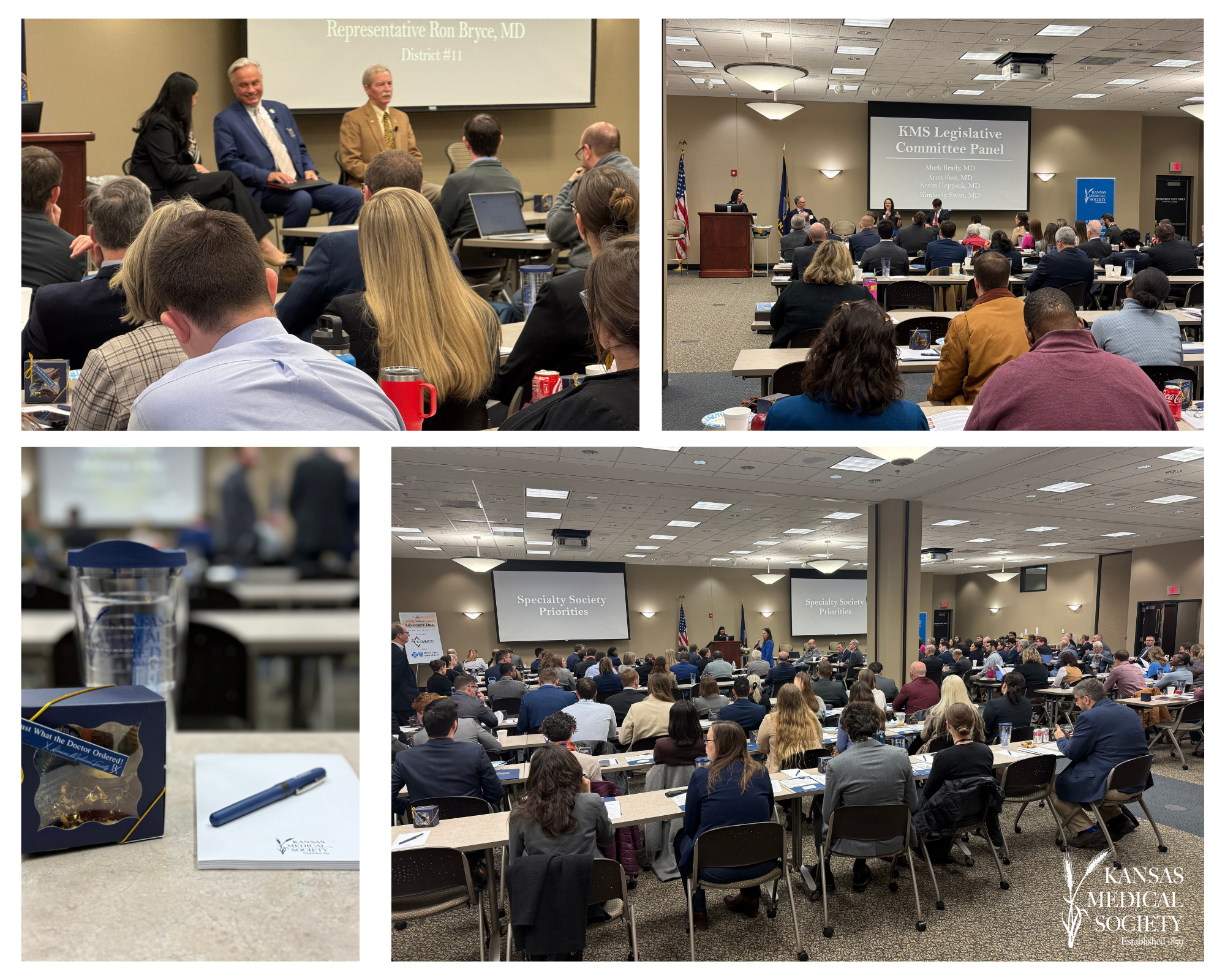|
|
|
While KMS members converged upon the state capitol this week, legislative work ramped up with several issues being introduced, hearings held and some issues advancing for votes.
SB 19 establishes the “conscientious right to refuse act” to prohibit discrimination against individuals who refuse medical care, and creating a civil cause of action based on such discrimination, and also revoking the authority of the Secretary of Health and Environment to quarantine individuals and impose associated penalties. The bill is scheduled for a hearing and vote next week. KMS opposes SB 19.
SB 41 follows the recommendation of the Health Care Stabilization Fund Oversight Committee to add two categories of APRNs to the Fund, requiring them to purchase $1M in malpractice coverage as a condition of licensure. The bill is scheduled for a hearing in the Senate Health committee next Thursday. KMS supports SB 41. (More on this topic below).
SB 63 bans the surgical and prescriptive treatment of gender dysphoria on minor children and establishes a new civil cause of action against healthcare providers engaging in such practice. The bill was heard in both health committees early in the week, was advanced to the Senate and then the House, and passed both chambers with large majorities. It now goes to the Governor who has vowed to veto it, which will most certainly trigger what is likely to be a successful effort by the legislature to override the veto.
SB 67 establishes independent practice for Certified Registered Nurse Anesthetists (CRNAs) and eliminates restrictions on their scope of practice with the exception of surgery for the purpose of placing medical reservoirs. The bill preserves the Board of Nursing as their licensing and regulatory agency, despite the Board’s inability to regulate the practice of the healing arts, which this bill clearly allows. KMS opposes SB 67.
HB 2157 expands pharmacist's scope of practice to include point-of-care testing for and treatment of COVID-19. KMS opposes HB 2157.
Bills allowing for expanded optometric scope of practice (KMS opposes) and the establishment of licensure for Anesthesiologist Assistants (KMS supports) were introduced, but the language of the bills is not yet available. If you have questions about these or other legislative issues, please contact Rachelle Colombo.
KMS also testified before the House Social Service Budget Committee to report about the implementation of the legislature’s 9% across-the-board increase in the physician fee schedule for Medicaid. As many of you know, not all codes received an increase, including several global codes. The Kansas Department of Health and Environment reported that federal regulations prohibit any Medicaid codes from exceeding comparable codes in the Medicare fee schedule. Consequently, despite the legislature’s $30 million appropriation for a 9% increase to all codes, the following methodology was instead applied:
- Codes Currently > 91% of Medicare: increased to 100% of Medicare
- 9% Increase to all Codes < 91% of Medicare
- Codes with no Medicare Equivalent: increased by 9%
- Codes >= 65% of Medicare After 9% Increase: No increase above the 9%
- With additional funding, select Codes Under 65% of Medicare with High Utilization: Additional increase up to 65% of Medicare.
KMS reported this information back to the legislature and asked that the legislature direct KDHE to establish a new physician fee schedule for Medicaid that is not limited by the Medicare fee schedule and can be utilized by the Managed Care Organizations in KanCare. KDHE has not commented publicly on the request.
At the present time, of the four categories of advanced practice nurses licensed in Kansas, only two (nurse anesthetists and nurse midwives) are required by state law to comply with the provisions of the Health Care Stabilization Fund law. The largest category of APRNs (with ~7200 licensees), nurse practitioners, do not participate in the Fund, and neither does the last category, clinical nurse specialists (with ~370 licensees).
A question that has arisen in conjunction with the legislature’s possible action with SB 41 to require the two remaining APRN groups to participate in the Fund is whether the premiums charged to these two APRN groups will be adequate to cover their losses, or will other providers (physicians, hospitals, PAs, nursing homes, etc.) in essence have to subsidize the nurse practitioner claim costs. It has been the longstanding policy of the Fund’s Board of Governors that each provider group is rated and should pay premiums sufficient to cover the claims and losses generated by that provider group. For example, currently, there are different rates for nurse anesthetists and nurse midwives, and the nurse practitioners and clinical nurse specialists will also be rated based on their risk profile and losses produced.
There are currently 30 separate risk classifications used by the Fund, including eleven risk categories for different physician specialties, for example. The Fund’s actuary does a detailed analysis every year of losses by risk classification, and the Board of Governors uses that to adjust premium surcharges accordingly.
Because some APRNs are now allowed to prescribe independently under their expanded statutory authority, adding the remaining two APRN groups to the Fund would make the minimum coverage requirement for all APRNs consistent with that which is required of all other healthcare providers participating in the Fund, at $1 million per claim. This makes sense from a patient protection and public policy perspective, as it will assure patients who are treated by these APRNs will have the same statutorily assured right of compensation for personal injury sustained due to negligence, as they would have for virtually all other healthcare providers. For more information about the Health Care Stabilization Fund, click here.





















